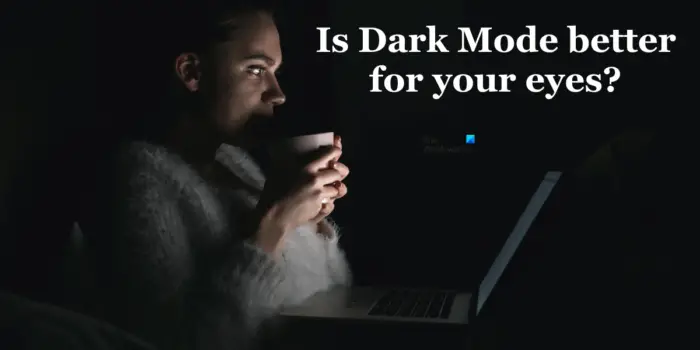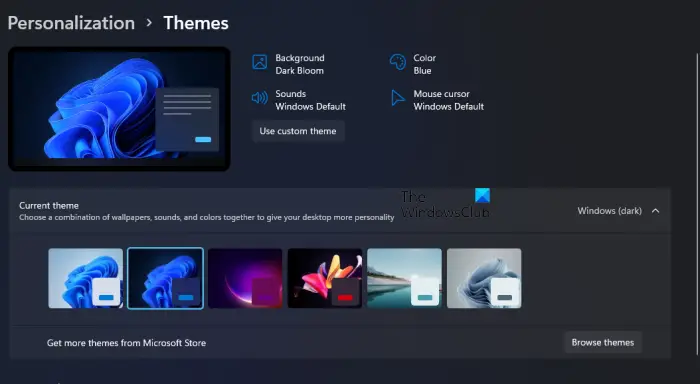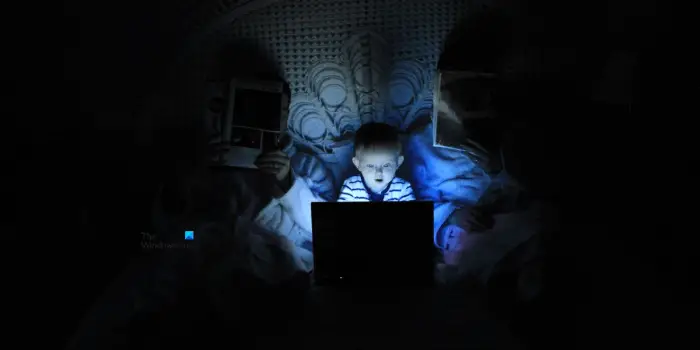Dark Mode is a setting or theme in different devices that makes the user interface dark. Most devices usually use the light theme by default. But you can change this default theme to the dark mode theme on your device, provided an option to do so is available in your device settings. The user interface in the light theme is white and the color of the text displayed on the light theme is black or gray. On the other hand, the dark mode theme uses a dark interface and the color of the text on this theme is usually white.
Today, a lot of users prefer using dark mode instead of the light theme. According to them, the dark mode reduces strain on their eyes. Does dark mode really reduce the strain on the eyes? If so, is dark mode better for your eyes? What are its advantages and disadvantages? What does the research say about it? In this article, we will discuss the effect of the dark mode on our eyes. We will also see its advantages and disadvantages.

Is Dark Mode better for your eyes?
The users who use dark mode on their devices claim that it helps reduce eye strain. This is one of the reasons why dark mode is becoming popular. Due to its popularity and the benefits claimed by the users, different device manufacturing brands started introducing dark mode to their devices. You can enable the dark mode on Android and iOS smartphones in your Smartphone’s settings. Moreover, Google has also introduced the dark theme in its search engine.
How to enable dark mode in Windows 11

Windows 11 lets users enable the dark theme on their systems. You can enable dark mode in Windows 11 by following the steps written below:
- Open Windows 11 Settings.
- Go to “Personalization > Themes.”
- Now, you can select the dark theme.
When you apply the dark theme on Windows 11, the entire interface will become black.
What is Blue Light and what are its effects on human eyes?
The dark mode is also intended to reduce the emission of Blue Light from the devices. Therefore, before we start our discussion on the effects of the dark mode on human eyes, it is important to understand the effects of Blue Light on human eyes.

Blue Light is a part of the electromagnetic spectrum having a wavelength between 450 and 495 nanometers. The devices including tablets, smartphones, televisions, and laptops have one thing in common, they all emit Blue Light. The Blue Light primarily comes from the sun and scatters in our environment due to which the color of the sky appears blue. Blue Light has more energy as compared to the other colors in the electromagnetic Blue Light sends our brain the signal that it is daytime. Apart from that, Blue Light may also have several benefits, have a look:
- It boosts alertness.
- It raises the mood.
Too much Blue Light exposure can lead to health risks. Some research shows that there is a connection between eye damage and short wave Blue Light. The short wave Blue Light has a wavelength between 415 and 455 nanometers. Most electronic devices emit Blue Light with wavelengths between 415 and 490 nanometers. Blue Light helps regulate cardiac rhythm (our natural sleep cycle) but watching TV or using a smartphone too late at night can have the opposite effect. According to some research, Blue Light stops or slows down the release of the sleep hormone melatonin which makes it harder to get a sound sleep at night. However, more research is needed.
Dark mode in devices helps reduce health risks by reducing the emission of Blue Light. People who support dark mode sometimes claim that using it at night helps them stay asleep for longer periods of time. However, this fact is not proven by research; the American Academy of Ophthalmology (AAO) suggests users set their devices to dark mode in the evening and the night in order to reduce the screen brightness and its warm colors for a restful sleep. They also suggest users avoid using their devices one to two hours before sleep.
What does the research say about the effects of Dark Mode on our eyes?
Research conducted in 2019 on iPad Night Shift Mode demonstrated that only changing the spectral composition of the self-luminous displays without changing their brightness settings may be insufficient for preventing the impacts of melatonin suppression. In other words, the study did not demonstrate any notable change between the people who used Night Shift mode on their iPads before going to bed and those who did not.
Research conducted by ResearchGate on the effects of the dark mode on visual fatigue and acuity optical see-through head-mounted displays demonstrated the following results:
- Visual acuity: The participants showed a higher visual acuity for the dark mode than the light mode.
- Visual fatigue: The study demonstrated that the visual fatigue of the participants was significantly less in dark mode as compared to light mode.
This research by ResearchGate concluded that dark mode helps reduce visual fatigue and improves visual acuity.
Advantages and Disadvantages of using Dark Mode
Let’s see the advantages and disadvantages of using dark mode on devices.
Advantages of using Dark Mode
The results of some research are in favor of dark mode, whereas, some research demonstrates that there is no notable effect of using dark mode on devices. However, the dark mode may have the following benefits:
- Eye strain: Dark mode may reduce eye strain. The people who use dark mode on their devices claim that it helps reduce eye strain.
- Blue Light emission: Dark mode reduces the Blue Light emission from the screen of an electronic device. This results in less damage to our eyes. However, there are other ways too by which you can reduce the Blue Light emission, such as lowering your screen brightness at night, turning on the Blue Light filter, etc.
- Battery life: It is not a health benefit. Dark mode may save your battery life. This is because when the dark mode is turned on, the device has to power a relatively fewer number of pixels in the background as compared to the light mode.
Dark mode may also help with the following eye symptoms:
- Frequent dry eye
- Eye strain or pain
- Migraine
- Insomnia
- Visual disturbances
Disadvantages of using Dark Mode
Above, we have seen some advantages of using dark mode on our devices. Let’s talk about some disadvantages of using dark mode.
- Using the dark mode in bright light conditions may cause strain on our eyes.
- In some cases, the dark mode may cause the text to appear washed out which results in eye strain.
- Dark mode on older devices with LCD screens may not save battery life.
Conclusion
The effects of dark mode vary from person to person. Hence, the pros and cons of dark mode also differ from person to person. Some people claim that using dark mode reduces eye strain. However, I feel dryness in my eyes while using dark mode for a long time.
Read: How to use Dark Mode in Google Docs, Sheets, and Slides.
Is dark mode better or worse for your eyes?
The effects of the dark mode on the eyes are not the same for all people. Most research is in favor of dark mode, whereas some research does not show a significant change between the people who use dark mode and the people who do not.
Is dark mode good for eyesight?
Some studies show that dark mode helps increase visual acuity and decrease visual fatigue. But if you feel uncomfortable while using dark mode, stop using it and turn on the light mode. In this case, it will be better to decrease the brightness of your screen to lower the Blue Light emission.
Read next: How to enable Dark Mode in Word, Excel, or PowerPoint.
Leave a Reply